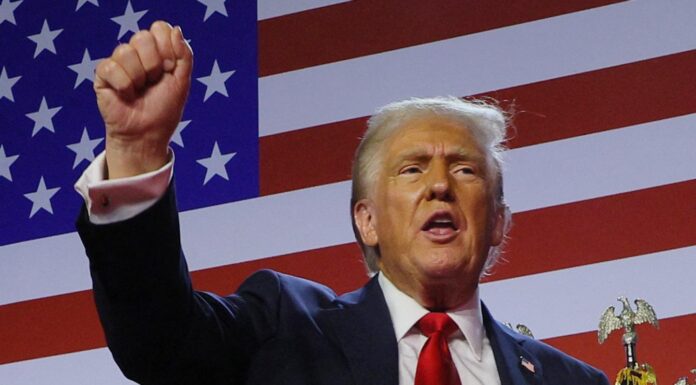‘We don’t want other leaders and other countries laughing at us anymore,’ Donald Trump said in June 2017 when he formally announced America’s withdrawal from the Paris Agreement, the international deal signed in December 2015 to halt global heating. He’s promised to do it again.
One of Joe Biden’s first acts after taking office in January 2020 was to sign an order reversing Donald Trump’s decision to pull out of the Paris Agreement, the global undertaking to try and limit global heating to 1.5°C. Next week’s election could decide whether the US is on its way out again.
“I was a minister the last time we had President Trump in the White House,” Isabella Lövin said in a press briefing this week. She was a cabinet member in Sweden from 2014 to 2021, in charge first of international development coordination then for three years held the environment portfolio.
“When the US withdrew from the Paris Agreement…that really made it very clear that no one else in the world is stepping forward,” said Lövin, now sitting with the Greens as a member of the European Parliament. With neither Beijing nor Delhi showing leadership, and major greenhouse gas emitters able to “hide behind the US”, it was up to Brussels to keep the Paris Agreement afloat, she believes.
“It was the European Union that really managed to keep the process going at the climate COPs during those years,” Lövin said.
“It’s extremely fortunate that we have now real commitments from Ursula von der Leyen to bring forward and continue with the Green Deal, and that the EU is steadfast on that.”
In many ways, the timing couldn’t be worse. Biden’s senior advisor on international climate policy John Podesta may only find out days before setting off for Baku, if at all, whether his negotiations will be haunted by the spectre of an incoming US president who has promised to pull America out of the Paris Agreement for a second time.
Of 198 parties to the United Nations Framework Convention on Climate Change (UNFCCC), only three – Iran, Libya and Yemen – have not ratified the Paris Agreement signed at the 21st conference of parties (COP) in 2015.
Podesta will head a sizeable delegation, announced on Thursday (31 October), which includes energy secretary Jennifer M. Granholm and agriculture secretary Thomas Vilsack and whose stated mission is to “highlight US leadership on tackling the climate crisis and to work towards strong negotiated outcomes”.
For many active in the transition to clean energy, upon which countries in the developed world are basing much of their contribution to global climate action, changes of government around the world are just one of many vicissitudes that have to be dealt with as they come.
Ann Mettler, who is European vice-president of the Bill Gates-founded Breakthrough Energy, declined to comment on “elections elsewhere” when speaking to Euronews earlier this week.
“I think for Europe, the bottom line is that we need to accelerate our own energy transition completely, irrespective of what happens in other geographies,” Mettler said – both because it is a climate imperative, and because the EU wants to retain its position as world leader in climate ambition.
“This also needs to be part and parcel of the new competitiveness strategy and the new Clean Industrial Deal,” Mettler said, referring to flagship policies of the incoming second Commission under president Ursula von der Leyen.
“Completely irrespective of what happens next week, Europe has only one way to go, and that’s to accelerate the clean energy transition for climate reasons, for security and for competitiveness.”
The central theme at the Baku talks is climate finance, and in particular the setting up of a New Collective Quantified Goal (given NCQG), intended to replace the $100bn a year fund that a handful of developed countries were supposed to muster by 2020, only hitting that total two years late.
The EU and US will be pushing to broaden the contributor base to include emerging economies like China, now an economic superpower responsible for about 30% of global greenhouse gas emissions, according to the EU scientists.
In addition, the US – which the fracking boom of recent decades has turned into the world’s largest producer of oil and gas – will be expected to chip into a separate Climate Finance Action Fund announced by the Azeri COP29 presidency in July which will be based on voluntary contributions from fossil fuel-producing states and corporations.
The money is needed to help developing countries avoid the coal, oil and gas dependency that is the main cause of the climate crisis, and to adapt to rising sea level and extremes of weather that already pose an existential threat to many – and the existing $100bn pot is a drop in the ocean compared to the scale of the challenge.
In a report published in September, UNFCCC economists estimated that developing countries will need to invest $1.1–2.4 trillion dollars a year to 2030 just to meet their climate mitigation commitments, with adaptation costs coming on top of that.
“If the U.S. again leaves the Paris Agreement and maybe even the climate convention, why should developing countries make efforts or even sacrifices to do a transition,” Lövin asks. “Why shouldn’t they exploit their fossil fuels?”
In an extra twist, the European Greens called today on US Green Party presidential candidate Jill Stein to withdraw and endorse Kamala Harris, amid fears that protest votes for the rank outsider could tip the balance in Trump’s favour in key swing states.
“Right now, the race for the White House is too close for comfort,” co-chairs Mélanie Vogel and Thomas Waitz said in a statement.












